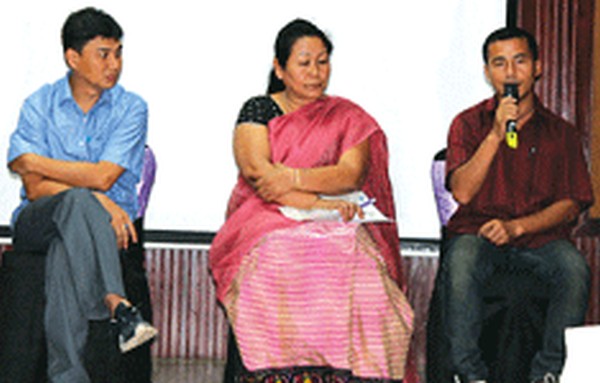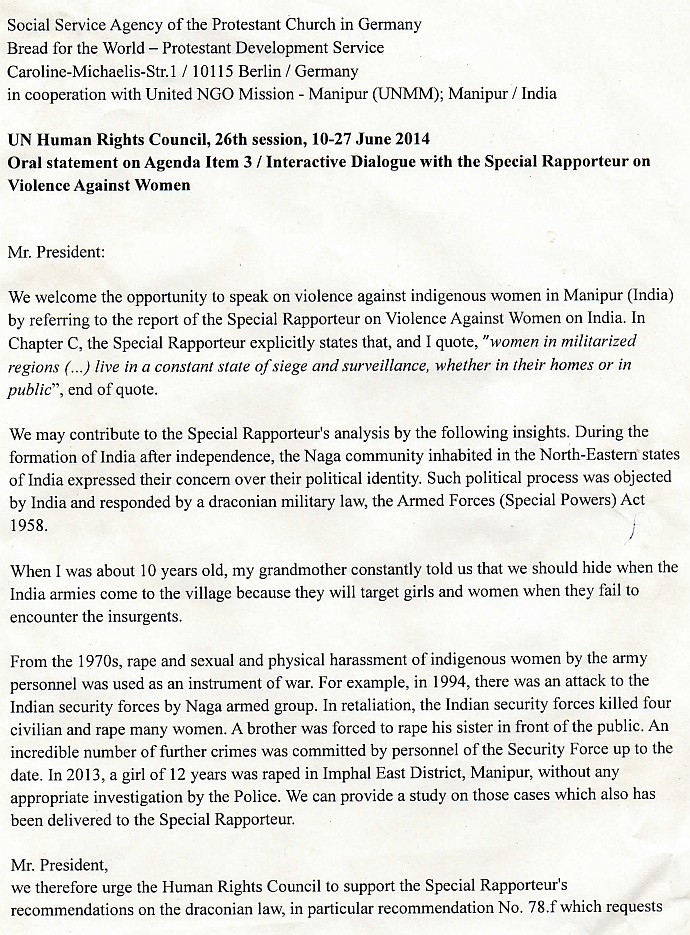Individual Statement from Debriefing at 26th Session of the UN Human Rights Council
Rashida Manjoo, Babloo Loitongbam, Sobita Mangshatabam and Thangjam Dolendro Meitei
Babloo Loitongbam *

Babloo Loitongbam , Sobita Mangshatabam and Thangjam Dolendro at the de-briefing event at Imphal on July 6 2014 :: Pix - TSE
26th Human Rights Council - Side Event
VIOLENCE AGAINST WOMEN IN INDIA
Wednesday, 11 June 2014
13.30 to 15.00 Hours
Conference Room No. VIII
Written statement by Rashida Manjoo
Special Rapporteur on violence against women, its causes and consequences
Dear friends and colleagues,
At the outset I would like to thank Liberation, Women in Governance, and the Working Group on Human Rights in India, for convening this side event, and for inviting me to contribute to the discussions with some of the findings from my official country visit to India in 2013.
It is important to highlight that my mission was underpinned by an understanding of the ongoing struggle in India for women’s human rights and its present complexities, including the role of the women’s rights movements in exposing the root causes of inequality, discrimination and violence against women. While due recognition of the complexities inherent to the country’s size and diversity need to be taken into account, it is also imperative that those are not used to explain, defend or justify violence against women or the failure to address it.
Violence against women and girls in India manifests in numerous ways and varies in prevalence and forms based on numerous factors including geographic location. Many manifestations of violence are rooted in multiple and intersecting forms of discrimination and inequalities faced by women, and are strongly linked to their social and economic situation. Furthermore, women from the Dalit, Adivasi, other Scheduled castes, tribal and indigenous minorities, and religious minorities, are often victims of a multiplicity of forms of discrimination and violence.
In addition to information on domestic violence, I also received information regarding violence and killings linked to dowry payments, as well as crimes committed in the name of “honour”, often perpetrated by family members with the complicity of community leaders. Other manifestations, both in the family and the community, included cases of forced and/or early marriages; discrimination and violence against widows, including sati; cases of witch-hunting; violence against lesbian, bisexual, and transgender persons; violence against sex workers; harassment and violence against domestic workers; violence against women with disabilities; sexual and reproductive rights violations; caste-based discrimination and violence; as well as communal violence against tribal and indigenous minorities, and religious minorities.
As regards violence against women which is perpetrated and/or condoned by the State, I received reports of violence against women in custodial settings, as well as violence committed in the context of forced evictions. I also heard of women from militarized regions, who often live in a constant state of siege and surveillance, whether in their homes or in public. I received testimonies reporting mass rape, allegedly by members of the State security forces, as well as acts of enforced disappearance, killings and acts of torture and ill-treatment.
Finally, during my mission I also studied the different manifestations of discrimination and violence against women in the transnational sphere. Many women refugees and asylum seekers, for example, are frequent targets of attacks and harassment by employers, landlords and community members in public and private spheres. The trafficking of women and girls from, and to, India was also reported as widespread, with disadvantaged women from minority groups, scheduled castes and tribes and the “backward castes” being usually the main victims.
The Government of India has recognized the need to address violence against women as a human rights violation, and also as an issue that detracts from the country’s path to prosperity and inclusive development. It has taken legislative measures in that regard, including measures to address rape and sexual violence. However, significant gaps remain in the legislative framework as regards the failure to recognize all forms of violence against women and to adopt a holistic approach that addresses the root and structural causes of violence against women. Moreover, there is a lack of effective remedies to address the main manifestations of violence against women, owing either to the absence of specific programmes or to a lack of implementation. The inability to ensure accountability and redress for victims has led to an increase of violence against women and the continued discriminatory treatment of victims.
The persistence of harmful practices, pervasive gender stereotypes and deeply entrenched patriarchal social and cultural norms is of serious concern. Based on the idea of superiority of men over women, those manifestations exacerbate women’s position of dependence and subordination and significantly obstruct effective implementation of relevant legislative and policy measures. Without a comprehensive effort to address them, in schools or university, at work, in the family, in the community and in printed and electronic media, the elimination of violence against women remains a challenge. It is essential that the authorities do not underestimate the negative effects of this challenge in their efforts to eliminate all forms of violence against women.
In my report I encourage the government of India to ensure specificity in addressing the multiple and intersecting inequalities and discrimination that women face. My mandate has consistently voiced the view that the failure in response and prevention measures stems from Government’s inability and/or unwillingness to acknowledge and address the core structural causes of violence against women. Linkages should be made between violence against women and other systems of oppression and discrimination prevalent within societies. A legislative and policy approach will not bring about substantive change if it is not implemented within a holistic approach that simultaneously targets the empowerment of women, social transformation, and the provision of remedies that ultimately address the continuum of discrimination and violence, and also the pervasive culture of impunity.
The Indian government has a due diligence obligation to prevent and adequately address violence against women. This includes an individual due diligence obligation towards particular individuals, or groups of individuals. That is, to assist victims in rebuilding their lives and moving forward, and to punish, not just the perpetrators, but also those who fail in their duty to respond to the violation. The State, however, also has a systemic due diligence obligation to ensure that a holistic and sustained model of prevention, protection, punishment and reparations for acts of violence against women is in place.
Most importantly, the State has an obligation to foster overall societal transformation to address structural and systemic gender inequality and discrimination.
It is my hope that civil society organizations will continue to contribute to these efforts, and work alongside the government of India not only in designing and implementing relevant schemes and programmes, but also monitoring and evaluating the progress made in eradicating violence against women in the country.
I thank you very much for your attention this morning, and wish you a fruitful discussion during this panel.
11 June 2014, 26th Session of the United Nations Human Rights Council,
Item 3 Interactive Dialogue with the Special Rapporteur on Violence Against Women
Speaker: Babloo Singh Loitongbam
Mr. President, Mr. President, this statement is delivered by the Commonwealth Human Rights
Initiative in association with the Working Group on Human Rights in India and the UN.
We welcome the report of the Special Rapporteur on Violence Against Women in India. The
country mission to India came after 15 years, significantly, and coincidentally at a time when
violence against women had become a major national concern. The report very aptly outlines
the due diligence obligations by the state to address not just the manifestations of violence – but
most importantly its causes and consequences, so that social transformation becomes possible.
While new laws, particularly those relating to sexual violence, are necessary, the report also
calls attention to longstanding gaps in prevention, protection, redress and reparation. Prevention
must strike at the gender stereotyping and victim blaming that normalise routine violence; it
must address structural inequalities that dehumanise marginalised constituencies and there is a
need for targeted public education in conjunction with our independent national machinery for
women.
We welcome the call for a qualitative assessment of the National Women’s Commission and
steps to ensure its independence and reiterate the need for India to strengthen women’s human
rights, by ratifying all outstanding international conventions and through repeal of laws like
AFSPA and section 377 of the Indian Penal Code.
We urge the government to consider with a view to implementing the Special Rapporteur’s call
for police reforms, including the need for strict accountability for dereliction, collusion and apathy
so that access to justice is possible and our laws are effectively implemented.
The report reminds us finally, that violence against women is played out differentially on women,
based on their context and marginalisation, that structures of inequality create conditions for
systemic cyclical violence. That caste, tribal, minority status, sexuality, disability, militarisation in
themselves create impunity for high levels of brutality and obstruct access to justice. Today, the
image of two girls belonging to a lower caste, hanging from a tree in rural Badaun is a stark
reminder of the State’s failure to fulfil its obligations to these girls. We call for an end to
structures of inequality that render some women so vulnerable to egregious violence.
Thank you.
26 TH SESSION OF THE UNITED NATIONS HUMAN RIGHTS COUNCIL
INTERACTIVE DIALOGUE
WITH
THE SPECIAL RAPPORTUER ON EXTRA JUDICIAL SUMMARY AND ARBITRARY EXECUTIONS
Agenda Item no 3
Statement by Thangjam Dolendro Meetei on behalf of World Barua Organisation
Thank you Mr. President!
The World Barua Organization thanks the Special Rapportuer on Extra Judicial Summary and Arbitrary Execution for his recommendation to repeal the Armed Forces Special Powers Act (AFSPA) to the Government of India. As mentioned in her report, AFSPA prevents the prosecution of criminal acts committed by the personnel of the armed forces. This includes rapes and murders.
On the night of 10 July 2004 a dozen Assam Rifle personnel broke into my house, my sister Thangjam Manorama was accused of being an insurgent. She was dragged out of our house, interrogated and torturedfor over three hours. No woman police was present while arresting my sister, as required by the law. The next morning my sister’sbullet ridden body was found on the road-side about three kilometers away from our house. There were semen stains on her dress.
After my sister’s death, Manipur broke out into a wide spread protest for the next two months.
The Manipur government responded by instituting a Commission of Inquiry. But military authorities challenged the competence of the Commission and have successfully suppressed the Commission’s findings. My family still has not seen the report.
The recommendation of the National Human Rights Commission, which came only in 2012, to pay some reparations for my sister’s rape and murder is still blocked by the Defense Ministry.
I simply cannot understand why, for ten long yearsAFSPA has been used to protect the very criminals who had raped and murderedmy sister.
The World Barua Oraganization therefore appeals to this Council to join the Special Rapportuer in his call repeal the Armed Forces Special Powers Act.
Thank you Mr. President.

* Babloo Loitongbam provided this infor tp e-pao.net
The sender can be contacted at bloitongbam(at)gmail(dot)com
This article was posted on July 07, 2014.
* Comments posted by users in this discussion thread and other parts of this site are opinions of the individuals posting them (whose user ID is displayed alongside) and not the views of e-pao.net. We strongly recommend that users exercise responsibility, sensitivity and caution over language while writing your opinions which will be seen and read by other users. Please read a complete Guideline on using comments on this website.








